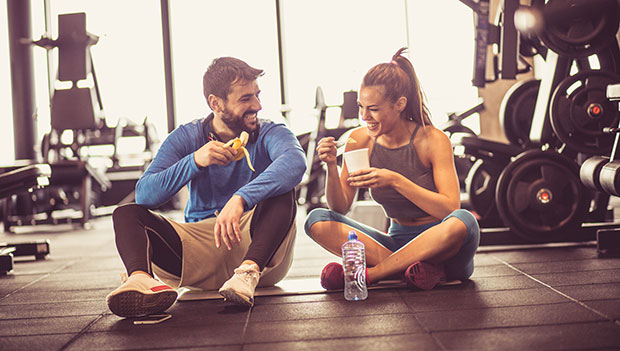
What to Eat Before a Workout | Nutrient Timing | Creatine Timing | Protein Timing | Best Pre-workout Supplements | Best Post-Workout Supplements | Best Creatine Supplements | Best Protein Powder Supplements
Should you eat a well-balanced, nutritious meal before or after a workout? While it seems like a simple enough question that should be answered with a yes or no, in reality, it's a bit more complicated than that.
The actual answer is, it depends. Fueling your body is crucial for recovery, which is why we broke down the ins and outs of nutrient timing. Keep reading to learn about the best time to refuel, what factors affect timing, and more.
Factors That Affect Nutrient Timing
Let's start with some exercise basics. Your body needs a consistent source of energy to power through exercise. When you exercise, your body grabs the most accessible form of energy to use: stored glycogen which is found in your muscles. Once glycogen stores are exhausted, the body then turns to existing blood glucose to continue. If glucose is running low, such as during a long endurance activity, the liver will create energy from protein.
Now let's take this information, and put it to practical use. When thinking “Should I eat before or after a workout?”, consider the following:
- Think about what kind of workout you’re planning to do. As mentioned above, it all boils down to the amount of energy that you exert during your workout. If you’re doing light exercise, it may not be necessary to eat before working out as you'll likely have enough glycogen stores (if you eat a generally balanced diet) to easily get you through the activity. If you’re planning a HIIT (high intensity interval training) workout, you'll likely need to fuel up with food beforehand to keep that energy up. Exactly when you should eat is a different story (we'll get to that in a bit).
- Consider the workout's duration. Similar to a HIIT workout, it’s important to eat prior to endurance exercise in order to keep your blood glucose up for an extended period of time. For especially long runs or cycling jaunts, it may even be necessary to eat during the workout itself to ensure your body remains fueled so your performance isn’t negatively impacted.
- Think about when you ate last. If you've eaten a balanced meal around three hours prior to the workout, you may be adequately fueled to support a reasonably timed, high-intensity activity. However, if you’re considering that same activity after an overnight fast, your performance will likely suffer and the activity will be far less enjoyable.
- Finally, remember that you're an individual. Your stored glycogen may be different from mine. Maybe you've had a few intense training days in a row and can't quite keep up to adequately replenish those stores. You might need a rest day where you eat enough to bring your glycogen stores back up.
But what about the best time to eat if you’re trying to lose weight?
Some research shows that by working out in a fasted state, the body can better metabolize fat, giving us improved fat loss. However, it appears that weight loss isn't necessarily the outcome of fasted exercise. Instead, you're more likely to experience poor performance.
So to address the question of whether or not you should eat before a workout to lose weight, the answer is most likely yes. If weight loss is your goal, just make sure you're still sticking to a negative calorie balance or caloric deficit. In other words, manage your calories properly so that your pre-workout meal doesn’t put you over your daily allotted calories.
We still haven't touched on whether or not you should eat after a workout. The answer to this is a resounding yes. Eating after a workout helps refuel your body by providing the nutrition needed to repair and restore fatigued muscles.
Let's get into some common guidelines regarding eating and exercise.
When to Eat Carbs
Carbohydrates are the body's primary source of energy. They’re converted to glycogen which is stored in the muscles, as well as glucose which is stored in the blood.
For endurance training, it’s important to eat meals high in carbs 3-4 hours prior to working out and you may even want to add a carbohydrate-based snack within an hour of working out. For long endurance workouts, it may be necessary to consume an easily broken down carbohydrate snack during the workout (like a banana).
Bottom line, carbs are the number one nutrient you should consume for good energy output before or during your workout.
When to Eat Protein
Protein contains the building blocks of muscle. It’s vital for the rest and repair phase after a workout.
While there is some improved muscle benefit from eating a good source of protein within two hours of your workout, whether you consume protein directly before or after your workout is irrelevant. Rather, it's more important to meet your protein needs via balanced meals throughout the day.
When Should You Eat Breakfast?
As we touched on above, eating breakfast before or after a workout depends on the type of workout performed.
Because you’re coming off of a long overnight fast, chances are both your blood glucose and glycogen stores will be on the low end. Why does this matter? If your upcoming workout requires high-intensity exertion or an extended duration, you likely won’t have enough fuel to get you through the workout safely which can prevent you from operating at your best. So, in cases like this, it's a good idea to have a moderate breakfast prior to exercise.
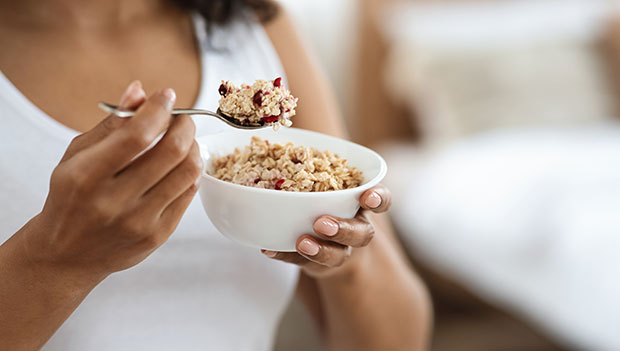
On the other hand, if you’re going for a brisk walk or short run, you might be able to get away with eating breakfast after exercise without impacting your overall performance.
Hydration
Hydration is a key component to exercise performance and recovery. Dehydration is not only unsafe, but negatively impacts exercise performance.
For this reason, it's important to make sure your fluid needs are met before, during, and after the workout while taking into consideration the environment. For example, more fluid, like liquid that includes electrolytes, should be consumed in a hot environment.
Avoid the Athlete Triad
Athlete triad is known as the interrelationship between low energy availability, menstrual dysfunction, and low bone mineral density. It’s thought to affect both men and women. The three major effects are:
- Low energy availability: This is caused by not eating enough to properly fuel the body.
- Reproductive outcomes: For women, this includes amenorrhea or loss of menstrual period. For men, this can cause low testosterone and sperm count.
- Low bone density: If you aren’t eating enough to help your muscles repair, then you risk losing bone density which could result in stress injuries.
The risk for athlete triad can be significantly reduced by introducing a balanced diet and by eating appropriately before and after exercise. Emphasis on the "balanced" diet as you need a variety of nutrients to protect your body against deficiencies. By taking in enough food, the body has plenty of energy for normal functions as well as exercise.
Overtraining can have a big impact on your risk for the athlete triad as well. By implementing moderation when planning workouts and following through with rest days, you can avoid overextending yourself and lower your risk for experiencing athlete triad.
Snack and Meal Ideas
You might understand logically the importance of eating before and after a workout, but things can get hairy when it comes down to preparing for meals and snacks. We break down some key principles to pre- and post-workout nutrition below:
Pre-Workout Nutrition
Below are a few meal ideas to consider three to four hours prior to your workout:
- Whole-grain pasta with grilled chicken and asparagus
- Veggie and shrimp stir-fry over brown rice
- Roasted sweet potatoes with salmon and steamed broccoli
- Oatmeal with blueberries and almond butter
- Spinach and egg scramble over whole-wheat toast
It’s important to emphasize the carbohydrates in these meals which help build up glycogen stores. Glycogen allows you to push through a workout with solid performance. In the above examples, the carbohydrates are, whole-grain pasta, brown rice, sweet potatoes, oatmeal, and whole-wheat toast.
Additionally, we want our carbohydrates to be as minimally processed as possible and in their true whole grain form. Why? Whole grains digest slower which reduces blood sugar spikes. Other great carbohydrate options are quinoa, buckwheat, farro, winter squash, and pasta alternatives made from brown rice, quinoa, and even lentils.
For an extra boost before a workout, fruits are also a great snack option.
If you'd like something a bit more substantial to have the hour before a workout, here are some snack ideas:
- Whole-wheat toast with peanut butter
- Greek yogurt with thawed frozen peaches
- Protein powder and milk
- Banana with almond butter
- Low-sugar granola with Greek yogurt
Post-Workout Nutrition
You might not feel hungry for a full meal right after your workout, but it’s still important to include a higher-protein food within two hours of exercise. You can have a post-workout snack or you can certainly have one of the meals listed below, however, the emphasis is now placed on protein instead of carbohydrates.
Ever had chocolate milk after a workout? Believe it or not, it’s not a bad option for a quick grab-and-go snack. The chocolate sweetness offers quick carbs and the milk is a nice combination of carbs and protein. It’s a solid option if you’re in a pinch.
Here are snack options to have after your next workout:
- Greek yogurt and fruit or low-sugar granola
- Whole-wheat toast with almond butter
- Shredded wheat cereal with milk
- Cottage cheese with mandarin oranges or pineapple
- Prosciutto and melon
- Rolled turkey with cheese and grapes
- Cheese and whole-grain crackers
- Tuna salad on whole-grain crackers
- Rice cakes with peanut butter
Or, if you’re hungry enough for a meal:
- Grilled chicken breast with asparagus and brown rice
- Egg, veggie, and potato frittata
- Tuna salad sandwich
- Soft tacos with lean ground beef and veggies on whole-wheat tortillas
- Shrimp and quinoa summer cold salad
- Oatmeal with fruit and nuts
- Turkey burger on a whole-wheat bun with a side salad
Final Takeaway
So, is it best to eat before or after a workout? While there isn't a clear black and white answer, for longer or more intense exercise, it’s more than likely necessary to eat before the workout. However, if you’re planning a low-impact activity and are generally well-fed, you might be just fine to go without eating before your workout.
One thing is certain: It’s important to eat after a workout, especially if you haven't fueled up before exercising. In this case, focus on high-protein meals.
Also remember it’s essential to maintain your hydration status before, during, and after exercise to ensure a safe and effective workout. And, by eating a balanced diet that meets your nutrient needs and exercising in moderation, you can avoid the athlete triad.
Disclaimer: I am not a medical doctor. This article is for informational purposes only. It is not a substitute for professional medical advice. Seek professional medical advice before making changes to your exercise habits.
What to Eat Before a Workout | Nutrient Timing | Creatine Timing | Protein Timing | Best Pre-workout Supplements | Best Post-Workout Supplements | Best Creatine Supplements | Best Protein Powder Supplements
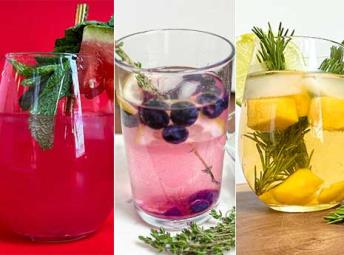
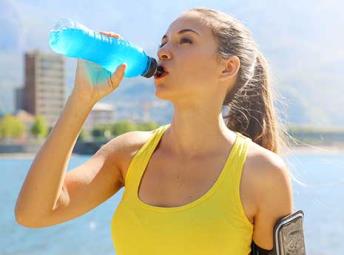
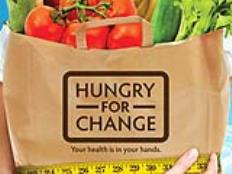
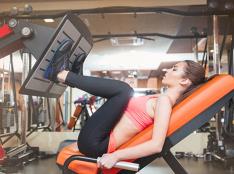



Discuss This Article